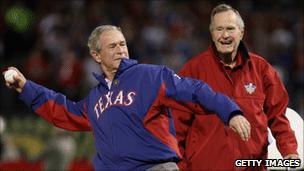Cheney angered by Bush decision on Scooter Libby pardon
- Published

Mr Bush threw out the first pitch at a World Series game last month, but has largely kept a low profile since leaving office
George W Bush had a falling-out with Dick Cheney over Mr Bush's refusal to pardon the vice-president's top aide in a spy-outing scandal, Mr Bush has said.
Lewis "Scooter" Libby was convicted of perjury and obstruction in a probe into the leaking of CIA spy Valerie Plame's identity.
Mr Bush told NBC News his decision to spare Libby a prison sentence rather than pardon him angered Mr Cheney.
But, in a interview to promote a book, he said the friendship had recovered.
"We are friends today," Mr Bush said. "I was a little concerned at the time. It was a hard decision at the time but that's what you do when you're president, you make hard decisions."
Lewis Libby was found guilty in March 2007 in the case connected to Mr Bush's decision to invade Iraq. He was sentenced to two-and-a-half years in prison and a $250,000 (拢155,077) fine. Mr Bush said the prison sentence was excessive and commuted it at the end of his presidency.
Libby's trial stemmed from the accusation that the White House had illegally made public the identity of Ms Plame, a serving CIA agent, in an effort to embarrass her husband Joseph Wilson.
Mr Wilson was a diplomat who had publicly challenged the White House's claim that Saddam Hussein had sought uranium from Niger in Africa.
Libby was found to have lied to investigators about conversations where he mentioned Ms Plame but he was not convicted of having directly leaked her name.
'Habitual drinker'
In in advance of the publication this week of Mr Bush's memoir Decision Points, the former president also discussed his widely-reported decision to give up drinking at his 40th birthday.
"I didn't like the person I was," he said, noting his preference for beer, martini and bourbon. "I was a drinker. Now, I wasn't a knee-walking drunk."
Mr Bush agreed with interviewer Matt Lauer's suggestion that he was a "habitual drinker" rather than an alcoholic.
"In either case alcohol becomes central to your life," he said, "and I finally woke up and I realised that if I did not want to live a life where alcohol was central."
Mr Bush credits the decision to give up drinking with his success in life, including winning the presidency in 2000.
According to advance excerpts from Decision Points, Mr Bush describes a "sickening feeling" about the failure to find weapons of mass destruction in Iraq, and reveals he briefly considered replacing Mr Cheney ahead of his 2004 re-election bid.
- Published3 November 2010